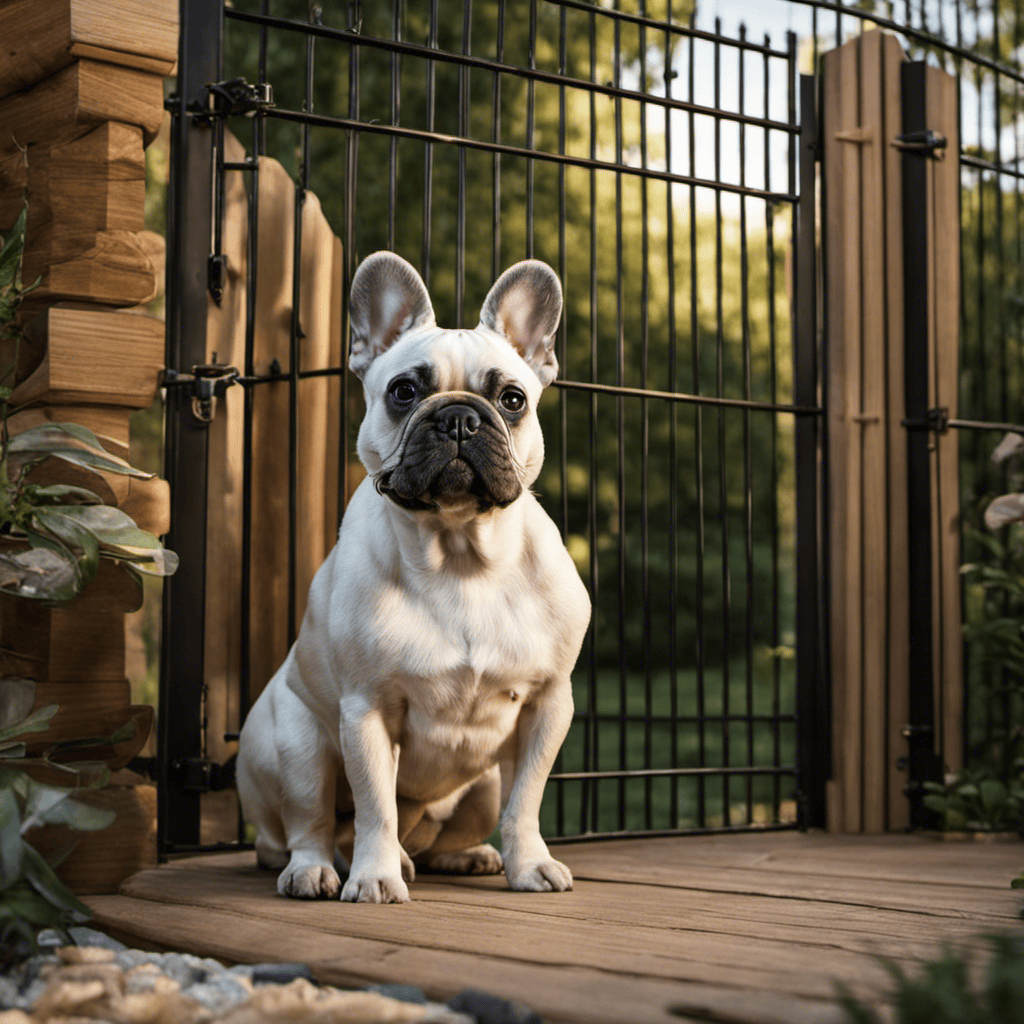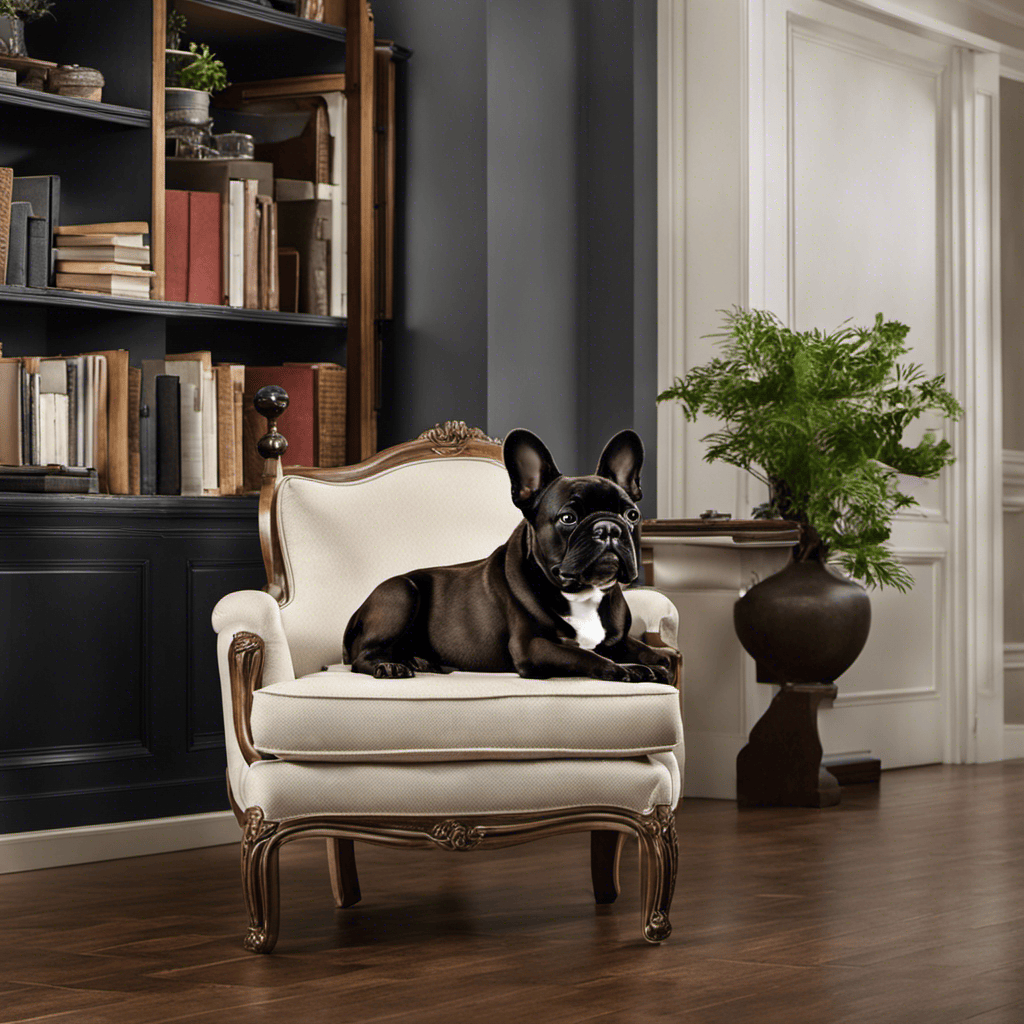Hey, Alex from FrenchyFab.com here, ready to spill the beans about French Bulldogs and their protective side. Are these adorable, bat-eared pups all snuggles and no bite? Let’s find out!
Key Takeaways
- Faithful Family Dogs: Frenchies bond deeply, forming a strong bond
- Feisty Watchdogs: They bark at anything unusual, including unusual sounds or loud noises – think furry alarms
- Protective Instincts: Their love can mean protective behaviors and a strong protective nature
- Fundamental Socialization: Early french bulldog socialization is a must
- Firm Training: Positive reinforcement and proper training shapes their natural instinct
- Not Fearsome Guards, But…: They’re no Doberman Pinschers but their alertness makes them surprisingly good watchdogs
From Ratters to Royalty: A Frenchie’s Journey

French Bulldogs weren’t always pampered pets. They started as ratters in England, bred down from English bulldogs. French lacemakers brought them to France, where their popularity boomed as a popular dog breed. This mix of companion and ratter shaped their protective nature. French bulldogs are known as a brachycephalic dog breed (short-nosed) nature makes them prone to respiratory issues.
French Bulldog History
| Period | Key Developments | Traits |
| Early 1800s | Smaller Bulldogs bred in England | Small size, tenacity, alertness |
| Mid-1800s | Lacemakers move to France with early Frenchies | Adaptability, companionship |
| Late 1800s | Popularity booms in France | Sociability, affectionate nature, gentle nature |
| Early 1900s | Breed standards established | Distinct looks, friendly temperament, bat-like ears |
| 20th-21st Century | Global companion breed | Loyalty, adaptability, strong bond |
strong bond
Frenchie Temperament: The Inside Scoop

French Bulldogs are charming, but there’s more:
- Affectionate: They crave love, thriving as the center of attention
- Faithful: They form incredibly strong bonds
- Alert: They notice everything, even unusual sounds
- Playful: These pups love to play with their best french bulldog toys!
- Stubborn: That famous Frenchie stubbornness means training is essential
Check out our guide on French Bulldog behavior: understanding their quirks for a deeper dive.”
Temperament and Protectiveness
| Trait | Description | Link to Protectiveness |
| Affectionate | Deeply loving | May drive them to protect loved ones |
| Faithful | Unwavering bonds | Fuels desire to keep family safe |
| Alert | Highly aware | Makes them excellent watchdogs |
| Playful | Energetic, enjoy games | Less intimidating, but still aware |
| Stubborn | Strong-willed | Can make training a challenge, but also means determination |
| Intelligent | Smart, capable learners | Helps them assess situations and react appropriately |
| Social | Enjoy company when socialized | Less likely to be fearful or aggressive |
| Adaptable | Thrive in various situations | Comfortable in different environments |
| Courageous | Brave despite their small size | May lead them to defend owners if needed |
| Calm | Relaxed when needs are met | More likely to react appropriately, not out of fear |
Are Frenchies Aggressive?
No! French Bulldogs have low aggression, especially towards humans. They’re bred to be companion dogs. But each dog is unique. They are not considered aggressive breeds or guard dog breeds.
Affectionate or Aloof?
Most Frenchies are cuddlers. Some might be more reserved, showing love in their own way.
Small Dog, Big Heart: Protective Instincts

Frenchies’ protective instincts come from their bond with their owners.
Common Protective Behaviors
| Behavior | Description | Triggers |
| Barking | Vocalizing to alert | Strangers, noises, perceived threats |
| Alert Posture | Tense body, ears forward | Feeling owner is in danger |
| Growling | Low, guttural warning | Feeling cornered or threatened |
| Following Closely | Staying very close | Desire to protect by staying close |
| Blocking | Positioning between owner and threat | Instinct to shield owner from harm |
| Nipping/Herding | Gently nipping/herding owner away from danger | Instinct to move owner to safety |
| Licking | Excessive licking in stressful situations | Anxiety or a way to comfort owner |
Shaping Your Frenchie’s Protective Nature
Your role is key! Training and socialization are crucial.
Socialization:
- Start Early: 3-14 weeks is vital
- Positive experiences: Make it fun!
- Continue Throughout Life: Maintains confidence
Training:
- Basic Obedience: Sit, stay, come – establishes you as leader
- Positive Reinforcement: Reward good behavior
- Address Unwanted Behaviors: Calmly redirect issues
Are Frenchies Good Guard Dogs?
They won’t scare anyone with their size or physical strength. But they’re great effective watchdogs. Their alertness and barking are a good deterrent to intruders. Think furry alarm system.
Frequently Asked Questions (FAQs)
Q: Do French Bulldogs make good guard dogs?
A: Not traditional guard dogs, but excellent watchdogs due to alertness.
Q: How do French Bulldogs react to strangers?
A: Socialized Frenchies are usually friendly.
Q: Can French Bulldogs be aggressive to other animals?
A: Possible without socialization.
Q: Are French Bulldogs naturally protective of children?
A: Yes, they often bond strongly with kids. Supervise interactions.
Q: Signs of a protective Frenchie?
A: Barking, alert posture, following, possibly growling.
Q: My Frenchie has separation anxiety. Is it related to protectiveness?
A: More about dependence. See my guide on french bulldog anxiety.
Q: How to stop excessive barking?
A: Teach a “firm”, “quiet” command, use positive reinforcement.
Q: What exercise do they need?
A: Daily walks, playtime. They are not an athletic breed.
Q: Are French Bulldogs expensive?
A: Yes, due to potential health issues, including respiratory issues.
Q: My Frenchie has breathing problems. What to do?
A: Common, due to their short-nosed nature. See a vet if you notice issues.
Q: What are common French Bulldog colors?
A: French bulldogs come in a variety of colors. You can find out more on my blog.
Q: What should I feed my French Bulldog?
A: Avoid bland foods and giving them an empty bowl of food. Instead, breed through education about what your french bulldog puppy needs.
Conclusion
French Bulldogs offer a unique mix of affection, loyalty, and protectiveness. While they’re not typical guard dogs, their devotion makes them great companions and effective watchdogs. Just as building knowledge leads to better understanding, proper training and socialization will help your Frenchie become a well-balanced family member.
References:
Good guard dogs typically have a level of aggressiveness that makes them effective in confronting and deterring intruders. French Bulldogs, however, are not naturally aggressive. They’re more lovers than fighters, preferring to make friends rather than stand guard.
Socialization: Ensure your Frenchie is socializing and well-exposed to different environments, people, and sounds. It builds their confidence and adaptability and can enhance their alertness.
There is a high risk of dystocia and difficult births, which makes pregnancies in this dog breed high risk.
Hi, I’m Alex! At FrenchyFab.com, I share my expertise and love for French Bulldogs. Dive in for top-notch grooming, nutrition, and health care tips to keep your Frenchie thriving.



